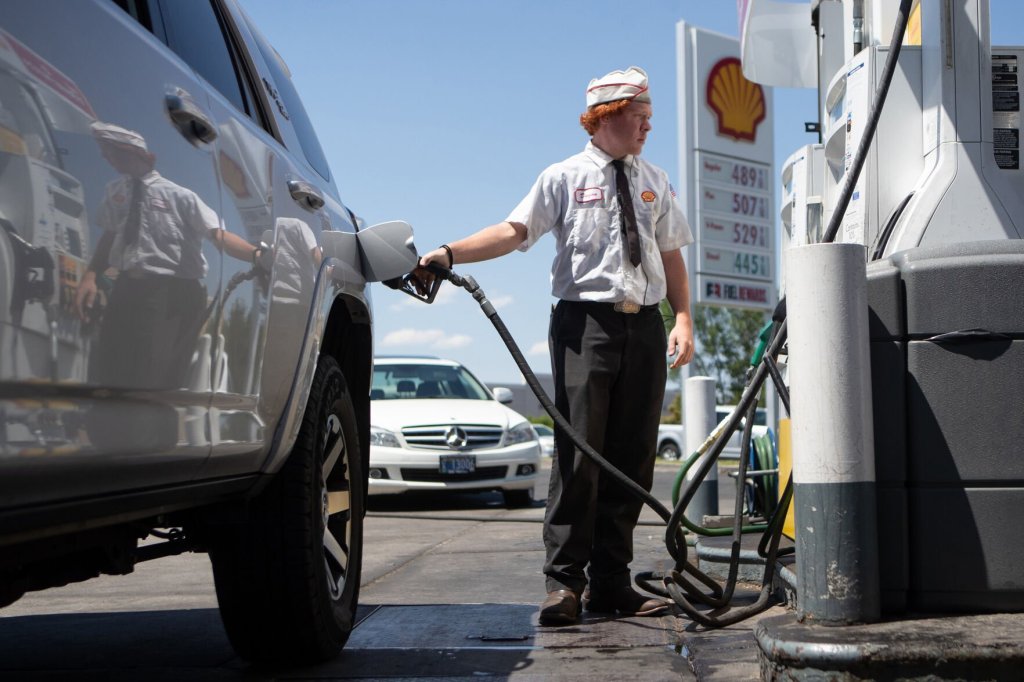Q&A: How will self-serve gas stations impact Oregonians?
Published 5:45 am Saturday, July 22, 2023

- Dagan Greiner pumps gas for a customer at the Shell station on U.S. Highway 20 in Bend on Thursday afternoon.
With just a few weeks left for Gov. Tina Kotek to sign a bill allowing Oregonians to pump their own gas, the impact of House Bill 2426 is expected to be minimal, though the consequences for gas station attendants statewide remains unclear.
If Kotek signs the bill, Oregon will permit self-service pumping at gas stations after 72 years, leaving New Jersey as the only state in the U.S. that does not permit self-service at gas pumps.
What is Oregon’s history with restrictions?
Oregon’s self-service restrictions date back to 1951, when legislators voted against self-service on the basis of public safety concerns. At the time, legislators cited the need for training to safely dispense gas, difficulties for some people, including elderly or disabled residents, and employment considerations, among other reasons.
Fueling stations have changed greatly over the last several decades. Originally, gas stations offered full service. This meant attendants would check and change a car’s oil, clean windshields and add wiper fluid, in addition to pumping gas for drivers.
Oregon eventually loosened restrictions in 2015, when the state legalized self-serve at night in some rural and coastal counties, which was expanded in 2017 to include all rural counties.
This was changed in 2020 to temporarily permit self-serve gas over the summer during the pandemic, when wildfires and heat waves were increasingly severe.
Will gas be cheaper for those who use self-serve gas pumps?
No. Gas prices will remain the same for self-serve and full service, which the bill clearly states.
Will stations still have staff on hand to pump gas?
Yes. According to the bill, any gas station that offers self-service must “designate at least one person to provide attended service.”
In addition, gas stations will be required to post signs clearly labeling which fuel pumps are designated for self-service and which supply service by a staff member. Stations are only allowed to designate up to half of their pumps as self-serve.
Marie Dodds, director of government and public affairs for AAA in Oregon and Idaho, said AAA wanted to ensure that people had the option to pump their own gas, while maintaining other options for elderly folks, disabled people or anyone else who simply prefers not to pump their own gas.
“We were mainly concerned about price and access for disabled or elderly drivers,” Dodds said. “This measure meets both of those.”
How will self-service impact gas station attendants?
For a lot of gas stations in rural counties that have been experiencing labor shortages, this bill could actually provide much-needed relief.
In an opinion piece from April, two gas station owners wrote in favor of House Bill 2426 — Louis Hernandez, who owns gas stations across Multnomah, Clackamas and Washington counties, and Haseeb Shojai, who owns gas stations across Bend, Metolius, Madras and Prineville.
Calling it “a matter of survival” for small businesses like theirs, Hernandez and Shojai argued that the bill does not take anything away from anyone and instead expands options.
“It would ensure our gas stations remain open for customers who need to refuel their vehicles,” they said in the article published before the Legislature passed the bill. “It protects attendants’ jobs while easing the pressure they face when understaffed or confronted by drivers who are in a hurry or prefer self-service. And it ensures attendants are still available for those who need or prefer them.”
They note that the labor shortage at gas stations “has no end in sight” and that the ban against self-service “creates an unnecessary burden” on station owners, employees and customers.
“This is not an issue of pay — our businesses offer compensation that is competitive with other types of retailers and stores,” stated Hernandez and Shojai. “There simply are not enough people available and willing to do this work.”
Gas stations in larger counties with fewer staffing issues might not need to fire many, if any, station attendants, as the bill allows stations to designate up to half of all pumps as self-serve and will still need attendants on hand.
Who supported the bill?
Supporters of the bill cite concerns about the labor shortage at gas stations and improving fuel accessibility in rural areas of Oregon that find it difficult to keep gas stations open at all hours.
The Oregon Fuels Association testified in support of the bill. The association represents Oregon’s locally and family owned fuel stations, fuel distributors and heating oil providers, which includes hundreds of small, independent businesses across Oregon.
“It is no secret that Oregon has unique gas fueling laws,” the association stated in its testimony. “Nevertheless, as explained by gas station owners, finding employees to pump gas is extremely hard — and even impossible in some cases — which in turn makes it impossible to keep gas stations open and operating. HB 2426 helps relieve pressure in this tight labor market, while preserving the choice to fuel your own vehicle or opt for an attendant to fuel the vehicle.”
According to Dodds, AAA has been involved in conversations about self-serve gas for decades.
She said AAA, which offers road service along with selling insurance, often receives calls from drivers stuck in rural, isolated parts of Oregon who are unable to pump their own gas because the lone gas station in that city is closed for the night, often due to labor shortages.
“We represent drivers. We’ve heard these anecdotes for years,” Dodds said. “This measure makes sure the prices are equal. That was something we really wanted when we looked at the bill.”
Who opposed the bill?
On June 23, the United Food and Commercial Workers Local 555 issued a response to the bill’s passage by the House, primarily citing job concerns for gas station attendants, as well as the wellbeing of elderly or disabled people who cannot pump gas themselves.
The union represents nearly 800 workers at 63 grocery-store fuel stations in Oregon. There are more than 2,000 gas stations in total across Oregon.
“The passing of HB 2426 is just another example of the misplaced priorities of the Legislature’s current Democratic leadership in Oregon,” Dan Clay, the president of the local, said in the response. “This bill is clear favoritism for big oil companies over the interests of workers. While some Oregonians may experience marginal convenience, the underlying motivation is just a corporate giveaway that adds a burden to disabled drivers and undermines the safety and welfare of workers.”
Sandy Humphrey, the secretary-treasurer for the union, said in the response that laying off just one employee per location represents millions of dollars a year that larger corporations are not paying in wages, benefits and public payroll taxes.
If the bill gets signed into law, Miles Eshaia, communications coordinator for the local, said UFCW Local 555 will need to further examine the part of the bill that enables gas stations to place attendants at half the gas pumps.
“We have to work out what that looks like with the employer,” Eshaia said. “For example, at Costco, with their gas pump stations, it’s physically harder to do self-service if you’re not trained with them.”





